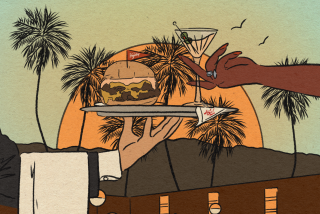Phil’s Markets : Strike Will Never End, Union Vows
Most of the clerks at Phil’s Food Queen Markets who went on strike in the summer of 1984 have found other jobs by now, and their union has all but given up hope of an agreement with the Sylmar-based food stores.
Does that mean the 16-month-old strike is over?
“No, it will never be over,” vowed Andrea Zinder, director of research and collective bargaining for Local 770 of the United Food and Commercial Workers Union, which represents the clerks.
“It’s still an unfair shop and we’re not declaring it over because we want consumers to know it’s an unfair shop,” Zinder said. “It doesn’t seem likely that we’ll get a contract, but we can foster public awareness.”
Little Public Awareness
Zinder concedes that public awareness of the Phil’s strike--at least beyond the immediate vicinity of the three Phil’s stores in La Crescenta, Sylmar and Lake View Terrace--cannot compare to the attention given the current strike at major supermarkets throughout Southern California by meat cutters and the Teamsters union.
Zinder’s union also represents meat cutters involved in the bigger strike. At Phil’s stores, meat cutters and Teamsters have contracts, Zinder said, but the clerks have been replaced by non-union workers.
“We will fight to the end,” Zinder said, calling it “a nasty strike.”
Mike Sirianni, a spokesman for Phil’s Markets, did not respond to repeated telephone requests for comment.
The Phil’s strike began when 75 clerks walked off their jobs Aug. 26, 1984, because the company refused to accept terms negotiated between the union and the Food Employers Council Inc., which represents 11 major supermarket chains.
Founded 34 Years Ago
Phil’s, a family-owned company founded 34 years ago by Phil Sirianni, does not belong to the FEC, but before 1984 it had accepted contracts patterned after the food workers union’s agreements with the larger chains. In that year, however, Phil’s said it could not afford the pension and medical benefits in the council’s contract.
The Sirianni family said the strike was triggered by a stipulation in the 1984 contract between the FEC and the union that bars the union from accepting a weaker agreement than the council contract in negotiations with independent markets. The rule applies to markets that have more than 25 workers at any one store or more than 100 altogether.
The union, however, charged that Phil’s wanted to break the union and that the company used the argument over pension and medical benefits as an excuse.
The Phil’s strike was part of a revolt in 1984 by about 50 independent markets in the Los Angeles area that resisted falling in line with food council contracts, Zinder said. About half eventually did conform, and the others were small enough to be exempt from the agreement and negotiated separate contracts, the union leader said.
The strike’s bitterness is reflected in records of the National Labor Relations Board.
Ruled in Violation
Last June, an NLRB administrative law judge ruled that Phil’s had violated the National Labor Relations Act on six occasions during the late summer and early fall of 1984, an NLRB spokesman said.
The judge, Joan Wieder, found that company officials had threatened employees with the loss of their jobs if they struck, by threatening individual workers and through letters that said Phil’s would not allow those who remained on strike to return to their positions.
In addition, Wieder said, a company guard brandished a revolver to threaten picketers, and Sirianni threatened to hit strikers with a car as he drove across a picket line.
Wieder ordered the company to post a notice for workers detailing her findings and declaring that the company would not repeat the violations. The federal labor act empowers NLRB judges to reverse the effects of unfair labor practices but does not authorize fines or other punitive measures.
On Dec. 5, the union appealed a decision by the NLRB regional director in Los Angeles, who had ruled that Phil’s could settle another set of charges against the company without having to address whether they were true. The union had charged that the company continued to violate federal labor laws throughout the winter and spring of 1985.
In the second set of charges, the union alleged that Phil’s harassed picketers by threatening five times to tow picketers’ cars from the markets’ parking lots, according to NLRB attorney Rina Wallack. Wallack said that other allegations include charges that a Phil’s employee raised his hand in a threatening gesture at a striker and that another employee tried to remove a sign from a picketer’s car.
Allowed to Settle
NLRB officials said the company was allowed to settle the second set of charges because it was less expensive than a legal fight. In the settlement, Phil’s agreed to post a sign stating that violations would not be committed. The company, however, was not required to admit that any wrongdoing had, in fact, taken place.
According to a daytime manager at a Phil’s market, picketers are a rare sight these days.
Zinder said it is difficult to find picketers because most strikers have new jobs, many of them at other markets, but she said they occasionally picket in their spare time.
“We’re still on strike, as far as I’m concerned,” Zinder said. “We’ve never settled our differences with Phil’s.”
More to Read
Eat your way across L.A.
Get our weekly Tasting Notes newsletter for reviews, news and more.
You may occasionally receive promotional content from the Los Angeles Times.






